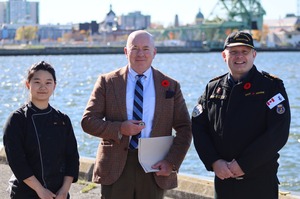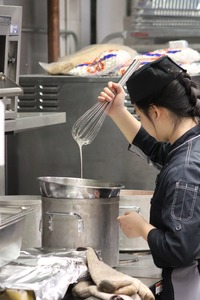Engineering Student Q&A: Elaine Xu
We met with Elaine Xu, a fourth-year co-op student at the University of Guelph majoring in Mechanical Engineering and minoring in Food Engineering. Elaine has balanced her studies alongside her student leadership role and is currently a cook in the Royal Canadian Naval Reserve. Additionally, she is part of the Serving Scholars program, which supports her unique journey as a student and military member.
How have you enjoyed your degree so far? Do you have a favourite course or project to work on?
I was nervous about my courses after my first year, especially when I got to complex topics like kinematics and dynamics or fluid mechanics. But during these courses something in my brain clicked by midterms, and I realized I actually understood the material and was enjoying it! My favourite courses so far are Design I and II because they let me be creative and work on projects with a team. In Design II, we worked on a toy rocket ship, which was inspired by the concept of a Kinder Surprise toy. The challenge was to create a design that could break down into smaller components and fit into a larger version of a Kinder Surprise egg using 3D printing technology. There was a lot of measuring and adjustments involved but figuring it all out with a team of engineering students was a rewarding challenge and a fun way to showcase my creativity.
What made you decide to take a Food Engineering minor?
I didn’t even know there was a Food Engineering minor when I started at the university. I had an interest in food science due to my passion for cooking. I’ve loved cooking since I was a kid, helping my mom out in the kitchen making fried rice or washing vegetables. Food was our family’s love language—if someone was feeling down, a nice meal was the go-to pick-me-up. I’ve always enjoyed trying new recipes and baking with friends. Halfway through my second year, I discovered the minor and realized it would be a great fit. I was already planning to take some food science courses, so turning that interest into a minor felt like a natural choice.
Tell us about the Professional Development Conference (PDC) and your role as Vice-President (VP) of Logistics.
The Professional Development Conference (PDC) is a student-run event hosted by the School of Engineering through the Engineering Society aimed at fostering professional growth and preparing students for the transition from academia to industry. This year’s PDC will take place on November 9th, focusing on the essential digital tools and strategies that help students excel in today’s competitive job market. As the VP of Logistics, I manage the behind-the-scenes organization, including catering, room bookings, registration, and finding guest speakers.
Tell us about one of your co-op experiences. What did you like about it?
My favourite co-op placement was at Cemcorp, a small consulting engineering firm. This close-knit environment was great because I got to see every stage of project development, from proposal drafts to finished projects. I worked closely with the engineers, joining them in meetings, and contributing to about 40 out of 50 projects happening at the time. My supervisors really created a supportive atmosphere, focusing on what I wanted to learn and helping me get involved in projects that matched my interests, like design, leadership, and project management.
What made you decide to join the Naval Reserves?
I decided to join because I had a great experience in Cadets from ages 10 to 16. I loved the community aspect, the discipline, and spending time with friends, so the idea of getting paid to do that was really appealing. When you join, you have to pick a trade, and I chose to be a cook. Since I was studying engineering, I wanted to do something different that allowed me to be creative and take a break from my technical courses. Being a cook has been super rewarding; I support the troops who work so hard every day with a nutritious meal. Good food plays a huge role in boosting morale, especially after a long, cold day on the water. There’s nothing like serving up a warm bowl of soup or fresh-baked cookies to make everyone’s day better.

What is the Serving Scholars program and what role does it serve for a university student in the military?
The Serving Scholars program at the University of Guelph provides support to students managing both commitments with their military service and academics. They support communication between me and the faculty, helping me navigate my course schedule and find accommodation for exams or assignments when needed.
For example, last year, Dr. John Walsh, an assistant professor and a key member of the Serving Scholars program, went above and beyond by bringing my midterm exam out to Kingston so I could take it while I was at a Small Boats Exercise hosted by HMCS Cataraqui in Kingston. This year, they’re doing the same thing for another midterm I have during a military exercise. It’s amazing to have that support, knowing they can advocate for me in ways I can’t as a student.
They’re also creating change to increase awareness of military students on campus. This year, we participated in homecoming in uniform to boost visibility.

What does being a cook for the Navy entail? What kinds of meals do you cook?
Being a cook in the Navy means you have to do every part of a cook’s role. Right now, I'm still training, so I'm learning various recipes and getting hands-on experience in all parts of the cook trade. Unlike a typical restaurant where roles are specialized, a military kitchen—called the galley on a ship—requires you to manage everything from baking and making salads to preparing entrees.
You also have to manage all the behind-the-scenes tasks, like serving, washing dishes, and cleaning up. Cooks are responsible for meal planning and ensuring there’s enough food on hand, which is crucial when you’re out in the middle of the ocean. We also have to cater to dietary restrictions, which adds another layer of complexity.
The meals have to be well-rounded and nutritious. Breakfast often includes eggs, bacon, fruit, and freshly baked goods. Lunch and dinner usually feature a main protein, alongside starches and veggies. At my unit, we often mix things up with themed nights, like Asian-inspired dishes or taco nights, and always try to include desserts like cookies or brownies.
Where do you see your career path taking you in the future?
Through my co-op experiences and coursework, I've realized that I want to work in the consulting engineering side of the food industry. I'm interested in building spaces and creating systems for food production. I've already signed on for my next co-op term with a food engineering consulting firm called IFAB, which specializes in building facilities for food. One day, I hope to consult on designs for kitchens and galleys for the military, combining my engineering knowledge with my military experience to create efficient kitchen systems.